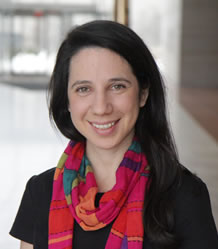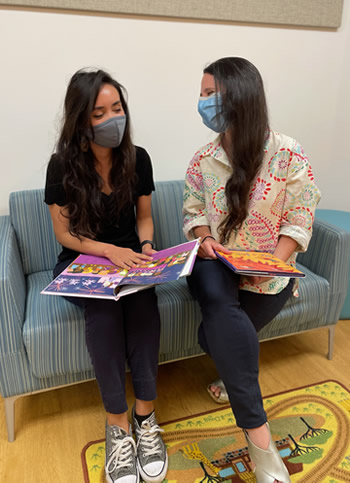
Adriana Weisleder, assistant professor in the Roxelyn and Richard Pepper Department of Communication Sciences and Disorders, has spent her professional life researching, connecting with, and advocating for bilingual children, particularly those from immigrant homes. A new community partnership with the nonprofit Northwestern Settlement is ensuring that her work reaches the populations that need her expertise most.
A 2021 Racial Equity and Community Partnership Grant issued by the University will allow Weisleder (WCAS05) and her Child Language Lab to bridge early literacy home and school programs for Black and Latinx children through the Northwestern Settlement (once but no longer affiliated with the University), which serves children and families in Chicago by providing short and long-term assistance to break generational poverty. The grant, Project LEAP: Literacy Empowerment Access Partnership, is one of 21 issued this year to advance racial equity in Evanston and Chicago.
“What we’re hoping to do is to launch a ‘parent fellowship’ that incorporates a diversity of early literacy practices,” she says. “We want to bring parents and early childhood teachers together so that they learn from each other to better address the needs of the children in their care.”

The second part of the project involves curating a diverse collection of children’s books families can access.
“We are really interested in the importance of kids seeing themselves in the books and the stories that they’re reading ,” Weisleder says. “We’re supporting early literacy through increasing families’ access to children’s books that are both culturally resonant and available in their home language.”
The grant is intended to be somewhat short term, in that the Child Language Lab will facilitate the creation and implementation of the literacy programs, but it will be up to Northwestern Settlement to put them into practice and continue them. The timing of this grant program was no accident—they were created to promote racial healing in a particularly fraught moment.
“This is something that we’ve been talking about in the lab—how to reach out more to the populations that we really want to support,” says Anele Villanueva, a doctoral candidate working in the Child Language Lab and involved in the partnership. “I’ve considered how I can do more to incorporate ethnic and racial equity in my own research. It’s actually given me more motivation to continue in academia because there’s so much that needs to be done still.”
While launching this program during the pandemic wasn’t intentional, it has made inequities harder to ignore.
“It has brought to relief for a lot of people these things that we’ve been thinking about for a much longer time,” Weisleder says. “It’s interesting to see more conversations around these divides and the needs of low-income Black and brown children—both from the pandemic and from the racial justice movement.
“Although this has always been a core motivation in our work, I think that our lab has refocused to concentrate even more on issues of equity and particularly anti-racist research… So that’s why we were so excited when this opportunity came along, because we were already going in this direction.”
